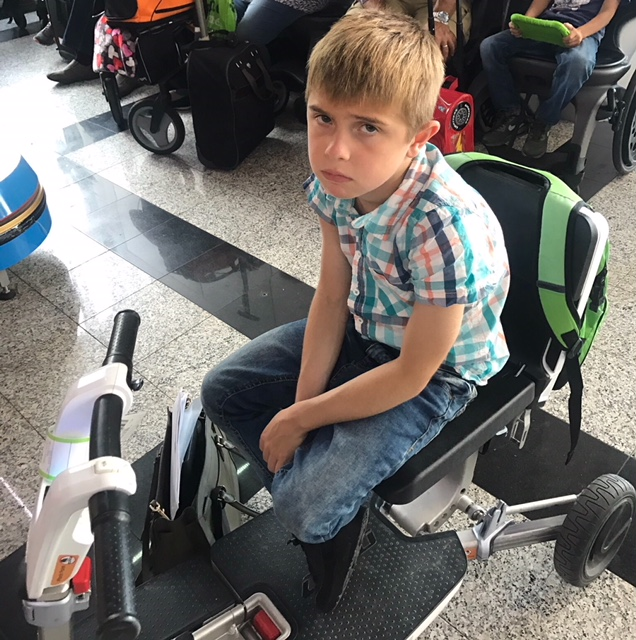“Do you have proof your son is disabled?”
Jack Johnson suffers from Duchenne muscular dystrophy. As his genetic disease worsens, the 10-year-old finds himself increasingly confined to his motorized scooter.
While returning from family vacation in Split, Croatia on Jet2, he ran into an issue at check-in. Jet2 requires at least 48 hours of notice to travel with a motorized scooter. Jack’s mother had called Jet2 reservations to notify them of Jack’s disability and the family had no trouble departing the UK. But the check-in agent in Split found no record of the request.
After consulting with colleagues, a Jet2 supervisor asked, “Do you have proof your son is disabled?” Jack began to cry and the family was mortified. The family did have paperwork, but it still took two hours to clear Jack to fly. By that time, his mother reports he was a basket case.
An Error, But Not A Malicious One
I can picture the check-in desk in Split, probably chronically understaffed to save money. There is a logistical hurdle to transporting a motorized scooter. Perhaps special equipment is necessary when departing from an outstation to load it onto the aircraft. And when the agent could not find any information on the event, what else could (s)he do than ask for additional details?
But the specific question…talk about tone deaf. This is an airport, not Disneyland. Why would a 10-year-old fake a disability? What kid wants to get to the front of the line to board a sardine can with no in-flight-entertainment?
On the other hand, even if Jet2 dropped the ball and did not properly record Jack’s issue, the issue was eventually resolved and Jack and his family flew home as planned.
Jet2 strikes a conciliatory tone in its statement on the issue:
We are extremely sorry to hear of this experience, and we appreciate that it has been very distressing for Jack and his family.
We have been in contact to unreservedly [apologize] for the upset caused, and we would like to reassure Jack, his family, and all our customers, that this is not our normal standard of service.
Although this is an isolated incident, we have [learned] a number of lessons and we are urgently reviewing all our procedures to ensure that this does not happen again.
The airline has offered £300 credit and a special tour of the airport for Jack. His mother has declined the compensation, calling it insulting. She claims Jack has suffered depression and anxiety as a result of the incident.
CONCLUSION
While I cannot excuse Jet2 for such an insensitive question, I do give them credit for finding a solution and offering an unequivocal apology. As for Jack, I wish him all the best and offer this advice: life is too short to sweat people who unintentionally hurt you.
Finally, this story has me thinking about Moses Bacon on BBC’s Come Fly With Me.
image: Joining Jack





The “western” sensitivities to EVERYTHING are astounding…Even though I feel very bad for the boy and his family, please understand that in Central Europe/Balkans we are not so concerned about “PC”…Ans please, stop imposing YOUR (i.e. western) culture upon other cultures…Of note – no, there is no universal culture. Just in case, I repeat again – I feel very sad for the boy and his family indeed.
I’d decided to bypass the opportunity to comment about the “spit in the face” headline in another post (as someone who has had that experience IRL, I view it as a fairly powerful – and perhaps exaggerated metaphor for a customer service deficit) , but note here that the use of the word “crippled” is ill-advised. It is anachronistic at best, and more likely offensive to those suffering from disabilities and those who love them.
Thanks Paul, I had no idea it was offensive and will not use it again.
As for spitting in the face, that also happened to wife in Dresden. A nasty incident. I still think that fits.
Thanks, Matthew. I think that’s why I avoided mentioning the spitting analogy. Different folks, different perceptions. As a person generally in control of his emotions, especially in professional practice, I was amazed at how visceral the experience of being spat at/on was for me. I was enraged, then amazed at my reaction.
Somehow I think Jack has probably been more humiliated by his mother’s grandstanding and attention seeking. After all, he got to fly home when he should have done and all was well.
Jet2 is not Ryanair, they have a reasonable reputation and admit they made a mistake and sorted everything out. End of.
A Bojko nailed it. It’s the Balkans. As someone who was born there, and lives in the west, I know that the PC culture here doesn’t translate there. If you are handicapped, then they call you crippled. If you are gay, like me, they call you a faggot. That’s the world we live in.
Matthew –
I’m sorry, but you (and especially the commenters) missed the mark on this one badly. Jet2 is a UK airline, they have an obligation to comply (for now) with EU regulations regarding passengers traveling with disabilities. They failed and they should be held to account or they will not perform better in the future. The fact that the Balkans are (at least according to your commenters) backwards countries doesn’t change those obligations.
And Matthew, you obviously don’t have a child with special needs, or you wouldn’t have made this comment: “I wish him all the best and offer this advice: life is too short to sweat people who unintentionally hurt you.” That’s ignorant, condescending and offensive. That child will face and overcome more challenges than you or I ever will or could. It should not be his obligation to look past the offenses of those who are required by law to protect him and failed to do so. Jet2’s failure and the pain inflicted on this child and his family weren’t unintentional, they were negligent.
Greg, I appreciate your comment. And you are correct what Jack is going through is something I cannot relate to. But a couple points. First, I am not telling him to look past the service lapse. Indeed, he is entitled by law to it and should assert his right under law to that service. Society thankfully has made progress in treating the disabled with equal dignity by providing greater access to things we often take for granted. Instead, I was advising Jack not to attack the people…as if the Jet2 workers wanted to be vicious. I don’t see evidence for that. Jack can and should look at them with compassion, noting they often speak and act from a position of ignorance. This relates to my second point. One of my heroes is Joni Eareckson Tada, a quadriplegic who has spent so much of her life in physical pain after a horrific accident. The grace and dignity she has in dealing with her handicap is an absolute inspiration to me and can serve as a particularly helpful inspiration to those who find themselves with physical handicaps. That was the root of my encouragement to Jack–not to simply “grin and bear it.”
Matthew – Thanks for your thoughtful reply. As you might have guessed, I have a son who has special needs.
In response to your comments, let me ask you a question. If this story were about someone who was blantantly mistreated by an airline because of their race or gender, rather than because of a disability, would you (a white man) tell them that the person should act with compassion and forgive the transgressors because they were ignorant (and again, they weren’t ignorant – they were negligent and failed to comply with applicable law)? Would you also suggest that they read a book and find inspiration from someone of that race or gender who acted with more “grace and dignity.”
I don’t know you personally, but you seem like a good guy, and I’m pretty sure you wouldn’t think and write about it the same way if the incident were about race or gender. My point is that Jack’s situation is no different and I’m asking you to think about it in that fashion.
As someone who has long followed the airline industry, and has either worked in industry related occupations over the course of a lifetime dating back to my first job after school as a teenager, and written about it extensively in the past, it really wasn’t until after meeting my partner, who had Polio as a young child, and has permanently impaired/reduced mobility that often results from this insidious disease, that I began to see first hand how the industry treats the elderly, and other reduced mobility passengers.
When we first me, and for the first two or so years, my partner refused to even entertain the idea of requesting wheelchair assistance, or any other kind of allowance for his reduced mobility, for personal and private reasons that were his to decide, despite my many pleas for him to seek the assistance his reduced mobility more than renders him eligible to receive to deal with the many long lines, and often very long distances to, from or between gates, that for most are unpleasant hassles, or nuisances, we wish we could avoid, but for reduced mobility persons, pose an entirely different set of challenges NONE of us can possibly understand until we face them ourselves, or watch as loved ones struggle in ways to cope with mobility challenges such as standing in place, or very slowly moving queues in zig-zagging rope lines for long periods of time (sometimes multiple times from checking in until boarding the aircraft on the departures side, or of course, to clear customs and immigration on the arrivals side of any international itinerary), not to mention attempting to reach gates at the largest metropolitan area airports/gateways/connecting hubs where distant gates such as those on Delta’s B side of Terminal 4 at JFK where any “B gates” beyond 30-32, and especially the high 30s, 40s and the RJ “bus terminal” at the very end are easily more than half a mile away from the check-in desks/bag drop when time is short, or there’s a sudden, last minute gate change and they’re then facing a need to travel long distances in short periods of time.
And that’s for airports where gates are under a common roof, when we all know, there are many airports (like JFK or London/Heathrow) where sometimes connections are in entirely different terminals at opposite ends of the airport.
Finally, and not really surprising, there was a turning point, where the stresses and heightened pain experienced from standing in lines too long to clear security at JFK Airport for nearly 90 mins (which was the actual event, but also was a problem when faced with attempting to dash from one side of the terminal to the other for a last minute gate change), resulted in him being sidelined by pain so great, he was nearly immobile for the entire trip, and the type of pain flare ups that he’s used to having from time to time that followed that incident lasted for weeks instead of the more typical few days (when that happens), convinced him to at least try, once, seeking wheelchair assistance as I had long suggested he was eligible to request, and which would also result in fewer and less painful flare-ups when he traveled.
That was more than a decade ago; and since then there has very much been a change for the worse in how (often badly) airlines now treat their reduced mobility passengers.
Originally, of course there was one airline we quickly learned was best avoided: US Airways
That airline was horrible. So, we avoided it whenever possible, after enough flights where wheelchairs simply never showed up, especially on the arrivals end of trips.
Then, after an unforgivable incident at JFK Terminal 8 in 2014, and yes, after the “US Airways-ing” of American Airlines had begun in earnest, we simply stopped flying that (even more so now) horrible airline.
But, notwithstanding US Airways of the past, or the US Airways of the present…er American…which have been uniformly bad before we put that airline on our “No Fly” list (twice from bad experiences in how they treated their reduced mobility passengers), there very much has been a change for the worse in recent years even at the “better” airlines such as Delta, or even Southwest (where the most recent humiliation was faced late last year by us, and several other reduced mobility passengers on the flight we were on).
In the case of Delta, we sure do remember the days when its roaming agents wearing “Red Coats” wouldn’t even wait until we reached the check-in desk to request a wheelchair, but rather came up to us upon seeing my partner, walking with his cane, and either saying a wheelchair was on its way, or even arrived with a wheelchair unsolicited, so he could be able to sit down as quickly as possible.
Alas, those days are now long gone.
At first, those bygone days of decency, dignity, respect, caring and most importantly, compassion and humanity, were replaced by being offered a space to sit down quietly and discreetly among other passengers while waiting for an attendant and wheelchair to arrive, before then heading towards security and the airside gates.
That “phase” of the devolution/degradation shown towards reduced mobility passengers ended a while ago, and although not nearly as dignified as the experience described above that always was deeply appreciated for how helpful, dignified, and compassionate as we knew it to be, the next “phase” where one was pointed to seats nearby that everyone used, and waited 10-15 mins for the wheelchair and an attendant to show up, was still far better than the shameful, and humiliating process now commonly experienced at major airports such as JFK Terminal 4, or perhaps the worst experience encountered to date, London’s Heathrow Terminal 3, which borders on being criminal given just how horrible and despicable our experience was earlier this year for a pair of departures (the arrivals there is better in that at least attendants are standing by upon disembarking – but the labyrinth required, plus the multiple handoffs to different people along the way, and changes of vehicles is quite a “process” for those with reduced mobility, so one can only wonder how someone completely immobile manages to use that crazy terminal that practically makes Delta’s distant “B gates” at JFK Terminal 4 seem like a cozy, two gate facility in a small city served mostly with a scattering of RJs per day!
Now, reduced mobility passengers are directed to wait in cordoned off “pens”, or something I refer to as being akin to “disabled/reduced mobility passengers’ penalty boxes” (punishments?) that are as prominent in their placement so those requiring wheelchair assistance know where to go (often far, far away from the check-in desks/bag drops), as they are prominent in setting apart for everyone in the terminal to see those whom are seated in the now cordoned off benches set aside for those who need assistance, plus their companions, if any.
Then there’s the epically long waits for attendants to be made available…
…oh, did I mention, epically long waits?!?!
Yep, these waits have become E-P-I-C-A-L-L-Y LOOOOOOOONNNNNNGGGG over the past two or so years.
And that’s at JFK Terminal 4, or perhaps Newark before Dr. Dao dragging for United, but since that, not quite as long in the waiting aspect even if those shameful, undignified “pens”/“penalty boxes” are still being used.
Then there’s Southwest, which our initial experiences nearly two years ago were amazing, but not so much as the year wore on last year at Newark and RDU with exceptionally long waits for departing flights, and BWI where the airline completely neglected my partner, and several others, late last year on the arrival end where we were connecting to another flight departing from a completely different, and far away, concourse.
Yeah, the message has been heard loud and clear in recent years: if we can’t charge an ancillary fee, we’re sure gonna make it clear how much we’d rather you, reduced mobility passengers’, realized that we’re gonna make you feel “our (shareholders’) pain” that we can’t charge you for the assistence you need by making it as hostile, user UNfriendly, as possible, by not just taking away compassionate “Red Coats” as Delta did, many of whom didn’t even need to be asked to bring over a wheelchair when they saw a reduced mobility passenger entering the terminal or standing in line to check-in/bag drop, but also by:
1.) herding disabled/reduced mobility passengers into cordoned off “pens”/“penalty boxes” (often quite a distance after having waited in line to see an agent at a desk to request the wheelchair, and then being directed clear across the headhouse to check in with the third party contractor’s agent there;
2.) then waiting practically forever for an attendant to show up (one time my partner texted/called me to inform me he had waited so long at JFK T4 he would for sure miss his flight; to its credit, Delta’s excellent disability services department intervened after I called them to ensure he made his flight for that incident; but there was an incident late last year where but for my prior work done at JFK Airport where I could begin name dropping who I’d call if things didn’t get moving, my partner would’ve again been facing a missed flight – I personally escort him via gate passes now whenever possible for his NYC departures on biz trips to better ensure he makes his flights);
3.) then, after an attendant shows up, being pushed to another waiting area just before the entrance to the area to clear security, where yet again, a long wait is encountered for a different attendant to show up to bring one through security to their gate
Yes, this is the experience as it has been lived for most of our recent trips in the USA, and incredibly, as bad as this is, yet still pales in comparison that is the horror we experienced at London Heathrow Terminal 3 – which really is shameful, immoral, and perhaps even criminal if our two experiences earlier this year are indicative of how reduced mobility passengers are treated there on a regular basis.
And surely, all because there’s NO ANCILLARY FEES in it for our (greedy) airlines, and they have instead come up with a hostile, indignified, unpleasant from start to finish “experience” where their feelings about not being able to slap a high fee for this absolutely vital and necessary assistance by many of our elders and other loved ones who face mobility challenges most of us cannot fathom being able to deal with nearly half as well, or as dignified, as my partner does on any given day is unmistakably palpable now.
Fine, maybe in this day and age, expecting attentive “Red Coats” to just show up at the ready with a wheelchair is expecting “too much” (said both with realism, but also with a dollop of sarcasm 😉 ).
But the process as experienced of late, is flat out immoral, disgusting, shameful, and likely in the case of LHR-T3, even criminal.
All because there’s no fees?
Rrrrrrrrrrrriiiiiiiiiiigggggghhhhhtttt, Delta (et al)?
(I won’t even bother posing that question to US Airways…er American Airlines…who, btw, has its check-in desks/bag drop at LHR-T3 immediately adjacent to the Virgin Atlantic/Delta section where we checked in…as that airline long ago made clear it has “no use” for disabled/reduced mobility passengers if they intend to seek wheelchairs and attendants to traverse the long lines and distances commonly encountered at airports)
Separately, regarding the mobilized wheelchair discussed in Matt’s blog post:
Typically, the reason seen as given on the many disabled/reduced passengers’ sections of airlines’ web pages is that the batteries must be accounted for to protect against ignition, combustion, etc.
So, the purpose of advance notification is for safety reasons – and something we should all believe is necessary and appropriate to require.
Now, if J2 (or other airlines when there are similar situations) lie to avoid dealing with whatever additional paperwork or other administrative functions, that’s an entirely different matter.
Fortunately, in this instance, and very much UNLIKE the clearly defined rights and protections we lack in the USA, EU regulations should offer recourse, assuming the situation as alleged/reported proves to be a correct account of the experience faced by the family and their reduced mobility child.